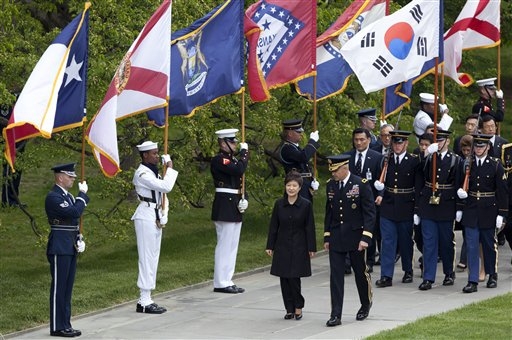
WASHINGTON (AP) — President Barack Obama and South Korea's new leader Park Geun-hye will seek to present a strong front against North Korea's nuclear threats when they meet at the White House Tuesday. But they also want to leave the door open to talks with Pyongyang.
Park has had something of a baptism of fire since she took office in February, two weeks after North Korea's latest atomic test that has ratcheted up tensions on the divided Korean Peninsula and undermined her hopes of forging a more trusting relationship with a difficult neighbor.
In Washington, Park's assured of a warm reception on a visit that also marks the 60th anniversary of the U.S.-South Korean alliance. Her Oval Office meeting, working lunch and joint press conference with Obama on Tuesday will be followed Wednesday by an address to a joint meeting of Congress.
White House senior director for Asian affairs, Daniel Russel, said Obama would reaffirm the U.S. commitment to the defense of South Korea. He said the joint appearance of the two leaders at the White House would make it crystal clear to Pyongyang that the allies stand shoulder-to-shoulder.
"In dealing with North Korea, it's vital we show unity," Russel told reporters.
Park touched down in New York Monday, meeting first with U.N. Secretary-General Ban Ki-moon — a former South Korean foreign minister — who praised her "firm but measured" response to North Korean provocations.
Park, the first democratically elected female leader in Northeast Asia, is no stranger to Seoul's Blue House, as the residence of the chief executive is known. She's the daughter of the late South Korean dictator Park Chung-hee and in her 20s took over the duties of first lady for five years after a gunman claiming orders from North Korea killed her mother in a botched attack targeting her father.
While focused squarely on the North Korean threat, Park's visit will be a chance to build a rapport with Obama, who enjoyed an unusually close bond with the previous South Korean leader, Lee Myung-bak. The two presided over the adoption of a U.S.-South Korean free trade pact in 2012 that expanded the scope of an alliance largely built on security ties and deterring an attack from the North. Some 28,500 U.S. troops are still based in South Korea for that purpose.
Lee took a hard line on relations with Pyongyang, cutting aid to the impoverished nation. While his approach had Obama's firm backing, public frustration in the South has mounted over the North's continued weapons' tests and provocations — including attacks in 2010 that left dozens of South Koreans dead.
In a change of tone, Park, although a conservative, has advocated trying to build trust with Pyongyang through aid shipments and large-scale economic initiatives if there's progress on the nuclear issue, even as she and South Korea's military promise to respond forcefully to any possible attack from the North.
But to date, relations have only gotten worse. After the North's nuclear test in February — its third since 2006 — it responded to the U.S.-backed tightening of U.N. Security Council sanctions by unleashing a torrent of belligerent rhetoric. It claims to have scrapped the 1953 Korean War armistice and has threatened nuclear strikes on the U.S. — prompting Washington to bolster missile defense.
Most recently, North Korea has withdrawn its 53,000 workers from an industrial park on its territory run by South Korean companies. After Pyongyang rejected Seoul's offer of talks, the South last week withdrew its last staff from the facility — closing the last remaining symbol of inter-Korean cooperation that began during the "sunshine" engagement policy championed by Lee's more liberal predecessors.
That's dimmed prospects for moves toward rapprochement. U.S. officials say they will be listening closely and with a sympathetic ear to what Park has to say both behind closed doors and to Congress about trying to find a way forward with the North under these very difficult conditions.
Dealing with Pyongyang's secretive regime, never easy, has become increasingly tough under the unpredictable young leader Kim Jong Un who came to power after the death of his father Kim Jong Il in December 2011.
The North has eased up its belligerent rhetoric in recent weeks and has yet to conduct a test launch of an intermediate-range ballistic missile that South Korean officials have been warning for weeks was being prepared.
But Russel cautioned it was premature to judge whether North Korea's cycle of provocation "is going up, down or zigzagging." He said both the U.S. and South Korea support "incremental engagement" with Pyongyang, but it has to take "irreversible steps" signaling a commitment to end its nuclear program.
The past year has already seen disconcerting progress in the North's weapons development, including its first successful launch of a three-stage long-range rocket, although it is not yet believed to have to have the means to fire a nuclear-tipped missile at mainland America.
The Obama administration has put increasing emphasis on the role the North's main ally and benefactor, China, can play to press Pyongyang to honor its previous commitments on denuclearization. But the U.S. has long viewed dialogue between South and North Korea as a prerequisite for moving forward with multi-nation aid-for-disarmament negotiations with the North, stalled since 2009.
Victor Cha, Korea chair at the Center for Strategic and International Studies think tank, said that despite Park's "trust policy" of opening up to both North Korea and China, the message she will want to convey in Washington is that her center of gravity is the U.S.-South Korea alliance.
"The message is going to be a tough one about enforcing sanctions, about a very principled approach," he said, "even as she hopes to build trust with North Korea."